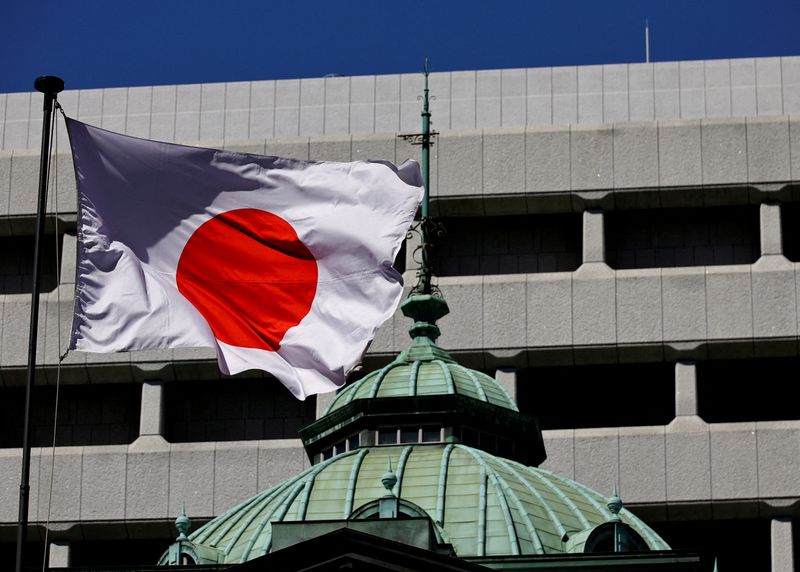By Leika Kihara
TOKYO (Reuters) - Japan's weak consumption may heighten, rather than tame, already growing political pressure on the central bank to raise interest rates to slow the yen's declines blamed for hurting households via higher import costs.
Such pressure will likely prod Bank of Japan Governor Kazuo Ueda to keep dropping hawkish signals on the policy outlook, but with plenty of caveats to hedge against the chance consumption may take longer than expected to rebound, analysts say.
The yen has depreciated by roughly 10% against the dollar so far this year despite the BOJ's decision in March to end eight years of negative rates, as markets focused on the still-huge divergence between U.S. and Japanese interest rates.
Data released on Thursday showed Japan's economy shrank more than expected in the first quarter, partly as rising living costs from the weak yen hurt consumption. Exports also slumped in a sign of the fading benefits to manufacturers from the weaker currency.
The soft readings alone likely won't force the BOJ to overhaul a steady rate hike plan laid out in April, as policymakers are focusing more on whether consumption will rebound later this year as they project, analysts say.
But they will heighten the importance of upcoming data on consumption, wages and service inflation, in gauging the timing of the next rate hike, they say.
"The BOJ is likely sticking to the view rising wages will lift consumption. But it will probably wait for second-quarter gross domestic product (GDP) data, due out in August, to check whether that's indeed the case," said Naomi Muguruma, chief bond strategist at Mitsubishi UFJ (NYSE:MUFG) Morgan Stanley Securities.
GRUMBLINGS CONTINUE
The weak yen has become a headache for Prime Minister Fumio Kishida by cooling consumption. Renewed price pressures from import costs are casting doubt on whether Kishida, already suffering from low approval ratings, can meet his pledge to turn inflation-adjusted wages positive in coming months.
While the BOJ has ruled out using monetary policy to affect currency moves, rising concern over the demerits of a weak yen has led some government and business executives to call on the central bank to hike interest rates from near-zero levels.
Inflation must stay moderate so firms can earn enough to keep raising wages, Masakazu Tokura, head of business lobby Keidanren, told the government's top economic council on May 10.
"Given the risk of the weak yen causing excessive price rises, I hope the government and the BOJ aim to achieve appropriate levels of inflation around 2%," Tokura told the meeting, where Ueda was also present.
Mana Nakazora, a private-sector member of the council, also urged the BOJ to help "moderate downward pressure on the yen" with monetary policy, according to the minutes of the meeting.
The discussions followed escalating government pressure that was already forcing the BOJ to modify its dovish policy communication in April that was blamed for triggering further sharp yen falls.
After a meeting with Kishida on May 7, Ueda said the BOJ will be "vigilant" to yen moves in setting monetary policy. A day later, he said the BOJ may hike rates if yen falls affect prices significantly.
The remarks contrasted with those on April 26, when he said recent yen falls won't immediate affect inflation - a comment that pushed the yen below 160 to the dollar and triggered suspected yen-buying intervention by the government.
While the yen has since recouped some losses to hover around 155, government grumblings continue.
Finance Minister Shunichi Suzuki told reporters on Tuesday the government and the BOJ must "avoid causing friction" with any policy divergence - remarks administration aides describe as a reminder for the central bank to pay heed to government concerns over the weak yen.
"In reality, current yen levels have a big negative impact on people's livelihood," a source close to Kishida's administration told Reuters.
In theory, hiking interest rates when the economy is weak makes little sense. The case is somewhat different for Japan, where short-term rates remain stuck around zero despite inflation exceeding the BOJ's 2% target for two years.
A modest hike in nominal interest rates will still keep inflation-adjusted, real borrowing costs deeply negative.
Former BOJ executive Eiji Maeda said the BOJ likely won't raise rates for the sole purpose of slowing the yen's declines.

But he said the impact of yen moves on prices may have become bigger than when Japan was mired in deflation.
"From this perspective, the impact a weak yen could have on inflation is important in guiding monetary policy," said Maeda, who expects the BOJ to hike rates as early as July.